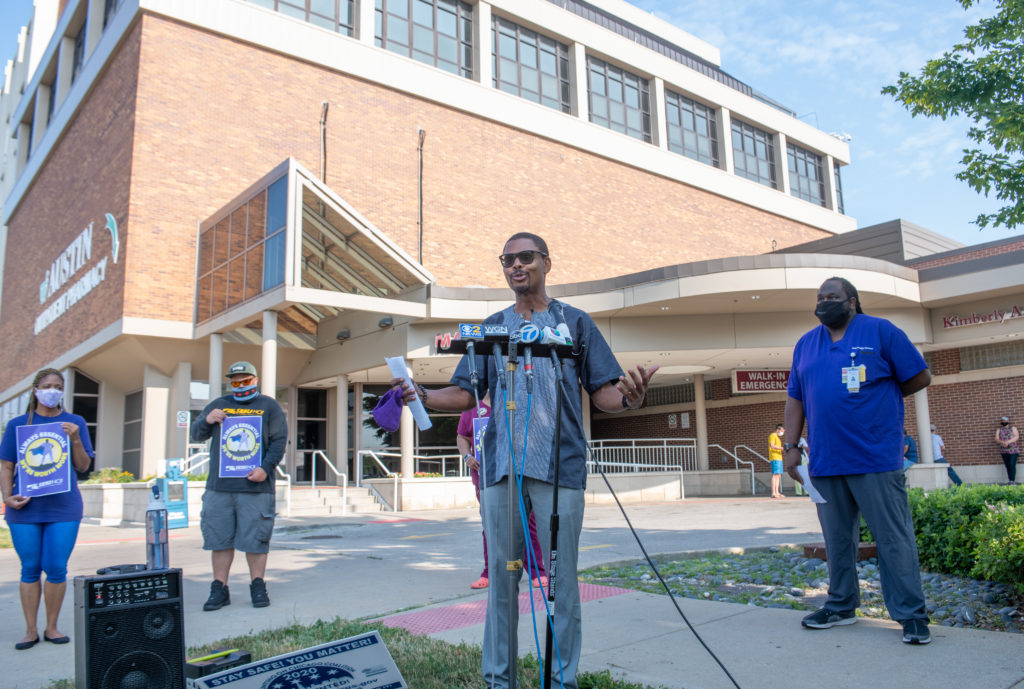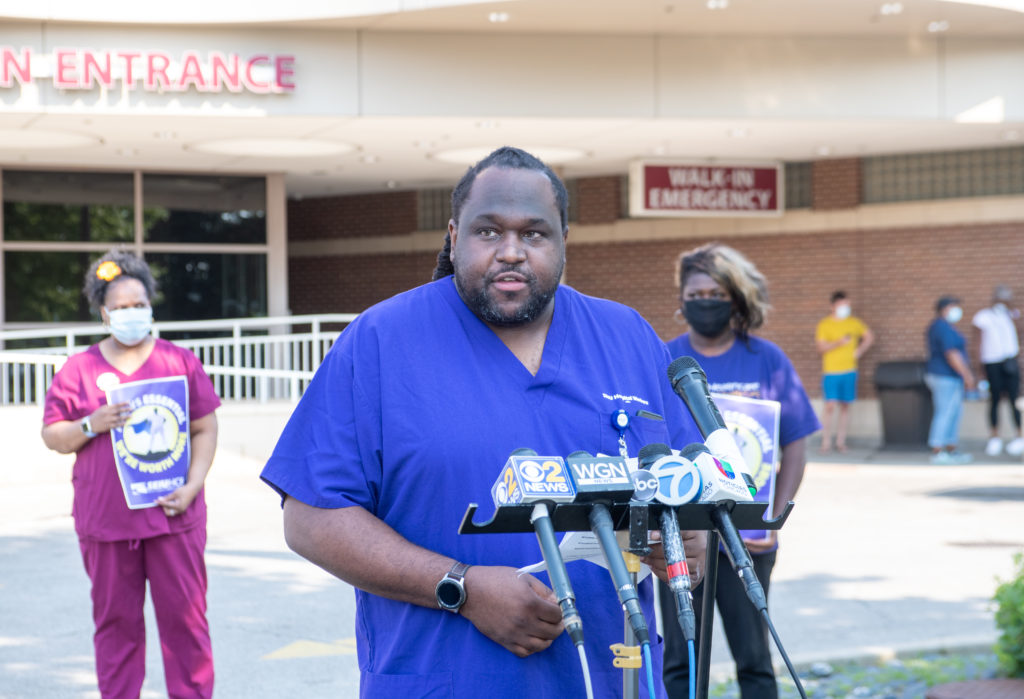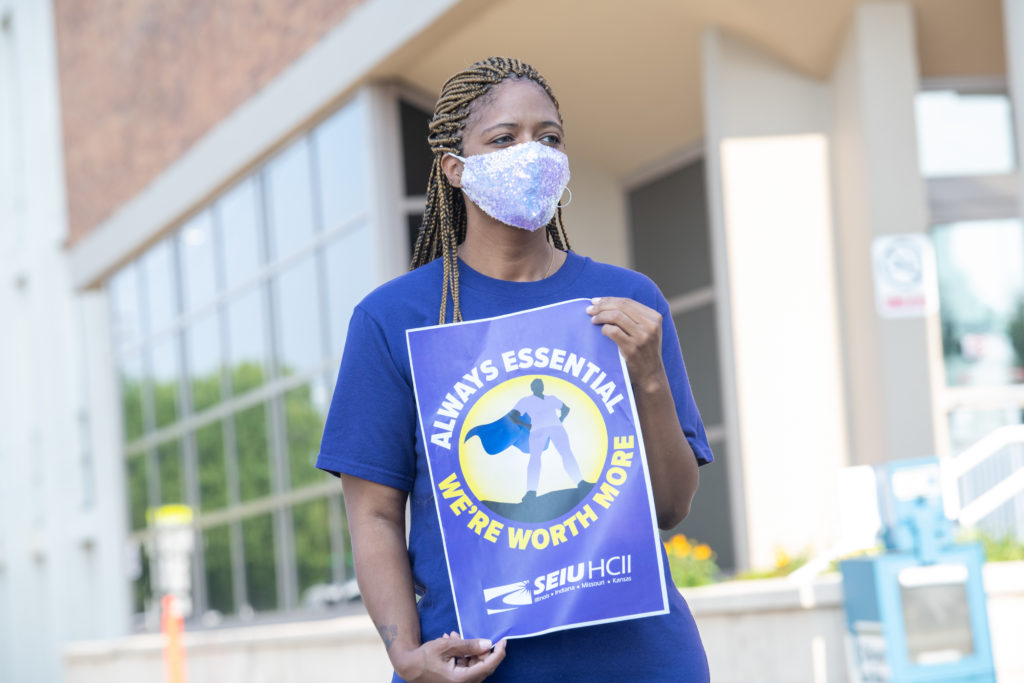Workers at Loretto Hospital Overwhelmingly Vote to Authorize a #StrikeforBlackLives After Management Fails to Bargain in Good Faith on Issues of Poverty Wages and Staffing

The COVID Frontline Caregivers Make an Announcement About Their Strike Vote and Bargaining Progress, Addressing Management’s Unfair Labor Practices and Workers’ Shared Commitment to Raising Poverty-Level Wages and Improving Staffing in Order to #ProtectBlackLives of Both Workers and Patients
CHICAGO — Hospital service workers at Austin’s Loretto Hospital, a safety net which has served as a life line to Black and Brown West Side communities plagued with disproportionate numbers of COVID illnesses and deaths in recent months, made an announcement early Thursday morning about their recent vote to authorize a #StrikeforBlackLives in response to management’s failure to bargain in good faith on critical issues impacting the safety and well-being of both workers and patients–including poverty-level wages and short staffing.
The service workers, represented by SEIU Healthcare Illinois, include Patient Care Techs, ER techs and mental health staff, and dietary and housekeeping staff. They have been in bargaining with Loretto management since December of last year and made the decision to conduct a strike authorization vote when management, through multiple unfair labor practices, failed to bargain in good faith with workers, resulting in little to no progress on issues critically impacting the safety and health of workers and the patients for whom they provide care.
On Thursday, workers gathered outside Loretto Hospital to make an announcement about their strike authorization vote and highlight their concerns about the bargaining process and its impact on their families and the communities they serve.
Loretto workers and the West Side residents they provide care for faced multiple crises before the pandemic struck, leaving both the predominantly Black essential workforce and the Black and Brown communities served by the hospital particularly vulnerable to the illness, death and economic predations of COVID-19. When workers began their contract negotiations with management in December, they lifted up the key issues of poverty wages and staffing with an awareness of how both take a toll on Black lives, safety and wellness.


While Loretto workers proudly choose to work at the facility because of their commitment to supporting care for the low-income Black and Brown communities the hospital serves, they have found themselves struggling to survive on poverty wages themselves—with many making close to minimum wage despite years of experience, training and advanced professional skills.
Low wages have a significant impact, exacerbating turnover and short staffing issues, which necessarily impacts patient care, leaving both patients and staff at risk. As a mental health facility, Loretto workers frequently encounter potentially violent and unstable patients and short staffing too often results in workers being beaten or assaulted.
In recent years, workers have spoken out to help Loretto and other safety net hospitals secure the funding needed to provide more care to more community members—with many attending lobby days in Springfield and other public actions.
In recent months as workers entered into negotiations for a new contract, they attempted to address issues of wages and staffing through the bargaining table and through multiple venues, including delivering dozens of letters to management, holding group meetings and press conferences to call for management to use CARES Act funding to increase wages to above poverty levels, and through online videos and other appeals.
The current bargaining contract extension covering these facilities expired in March and workers were originally hopeful that Loretto Management would agree to their modest and reasonable demands for increased wages and staffing provisions, especially as COVID has both increased their workplace risks and exposed the role of poverty wages and lack of a voice on the job in making Black and Brown workers and Black and Brown communities more vulnerable to the disease.
The refusal of management to bargain in good faith on modest provisions for wage increases and workplace rights drove workers to conduct a strike authorization vote as a last resort measure to win the measures and resources needed to protect themselves and the vulnerable community members for which they provide frontline care—both during this pandemic and beyond.
A majority of Loretto workers live in the communities served by the safety net and have a deep commitment to lifting up the health and economic well-being of their neighbors as well as that of their patients and their own families. These communities share a life expectancy that is as much as 12 to 30 years shorter than that of other areas of Chicago and experience disproportionate levels of poverty.
